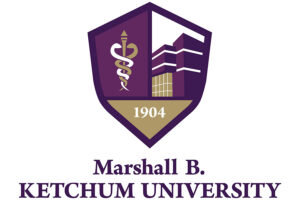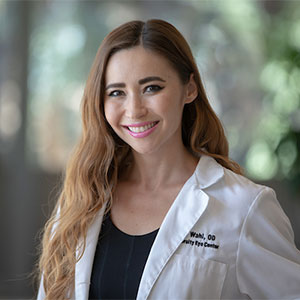(Editor’s note: INVISION Magazine has partnered with Marshall B. Ketchum University to examine the field of optometry. This column is the fifth installment in the monthly series.)
When I began my first year in optometry school, I felt like I was ready for it.
I was a motivated and ambitious learner with a great track record of achievement, which is typical of the kind of individual who pursues higher education in the health professions.
While these attributes did indeed help me to succeed in the four rigorous years of my optometric education, when I look back now at my time as a student, there are several pieces of advice I would give my younger self! I also believe that this advice is applicable to others who are on the verge of beginning their journeys to becoming practicing optometrists.
Learn From Failure
1) You’re going to fail something. But it will be okay!
I remember the first thing I failed in optometry school. It was a small proficiency test. Even though I had studied for it, my nerves got the best of me and I didn’t pass.
Advertisement
While I don’t recall what the test covered, I do recall how hard I took it. I had never failed anything in school, and it felt like the end of the world.
Now, I would advise my younger self to relax a little bit! While it’s obviously important to strive for academic excellence, optometry school also is very difficult. Most students fail something at least once, whether it’s a proficiency test, a quiz or an exam.
I would remind my younger self, in the grand scheme of things, that proficiency test did not affect my academic career in proportion to how worried I was about it. If I had that perspective, I would have treated myself with more compassion!
Waiting Gets You Nowhere
2) Don’t even try to get away with procrastination!
I think the most shocking discovery I made as an optometry student was that I was very quickly going to have to become an expert at time management.
One of the most important pieces of advice I would give to my younger self would be that you cannot get away with procrastination in optometry school. There’s just too much work to do. Not only are you and your classmates taking challenging classes and learning an enormous amount of didactic information, but you are also learning skills.
Advertisement
In addition to your normal studying, you’ll also be required to be in the lab, often late at night, practicing skills that are entirely new to you and difficult to master.
“It is essential to banish procrastination from your life!”
It’s tempting to do what you might have done as an undergraduate: learn all the content of a course, study it just enough to perform well on the final exam and then dump it out of your brain for good! But this won’t work in optometry school. Most of the classes build on each other. You have to master one before you can truly excel in the next. That’s why it is essential that you learn to manage your time and banish procrastination from your life!
Rub Those Elbows
3) Attend as many optometry meetings as you can.
I went to a few of these during my time as an optometry student. But I would advise my younger self to go to even more!
From the American Academy of Optometry (AAO) to Optometry’s Meeting (AOA) and Vision Expo, these are national meetings held annually for optometrists. These are great events for students to attend as well.
Advertisement
Attending these meetings is a great networking opportunity. Plus, every time you go, you leave feeling really inspired. You learn more about the profession and you meet new people who are succeeding in the profession you love.
As a student, it’s easy to get caught up with studying and boards and grades. You might even feel like you don’t have time to go to these annual meetings. But it is worth it to make the time!
Get Out There
4) Volunteer, volunteer, volunteer.
I volunteered a great deal while I was an optometry student. So, in this context, I would advise myself to keep it up! I’d even encourage myself to volunteer even more.
The benefits of volunteering are exponential for your time as a student and for how it shapes your perspective as a healthcare provider. There are so many opportunities to get involved in events like free vision screenings. Even if you’re a first-year student and don’t have the technical skills yet, you’ll discover that they need you!
I am currently the director of Ketchum Health University Eye Center in downtown Los Angeles. When I assign a student on rotation to perform a certain vision care task at one of these screenings, by the end of the day they are an expert at it! These volunteer opportunities are in invaluable way to practice, and learn and refine your skills as a provider.
Volunteering also provides an important perspective and reminder about why you are doing all this hard work in the first place. Hundreds of people may line up for these services. You learn just how privileged you are to be able to make a difference in other’s lives.
Conclusion
These are just a few pieces of advice I would give my younger self when I reflect on my time in optometry school.
However, in addition to volunteering, there are several other ways in which my advice to my younger self would be to keep doing what I was doing!
First and foremost was the importance of building relationships, both with fellow classmates and professor-mentors. These relationships sustained me in so many ways and were — in addition to all my hard work, of course — the key to my success.

___
About the author: Lisa Wahl OD, FAAO is an optometrist practicing in Los Angeles, California and is Clinic Director of Ketchum Health University Eye Center, Los Angeles.

Dr. Lisa Wahl, OD, FAAO at Marshall B. Ketchum University
Dr. Wahl graduated from UCLA with a B.S. in Biology and a minor in English Literature. She received her Doctor of Optometry at Southern California College of Optometry at MBKU, graduating Summa Cum Laude, and completed residency training in ocular disease at VA Los Angeles Ambulatory Care Center.
Thereafter, she worked at a prominent ophthalmology practice in Los Angeles, providing pre- and post-operative care for patients undergoing refractive, cataract and corneal surgery.
Her areas of interest are medically necessary contact lenses, dry eye and ocular pathology. She is an investigator in several research studies at Marshall B. Ketchum University and frequently lectures at continuing education seminars.
In her free time, she enjoys lifting weights, traveling, and exploring the local restaurant scene.